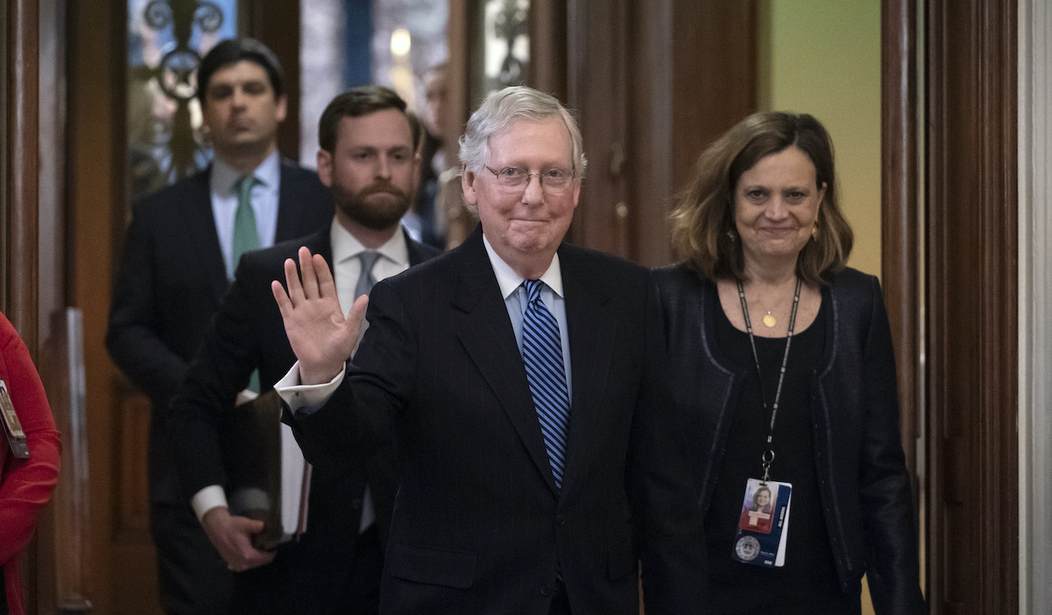So, how did that work out for everybody?
With impeachment now waning in the rear-view mirror, it is time to assess what it did for, or to, the cast of characters.
President Trump enjoys heightened popularity following a State of the Union address that accrued to his lasting benefit, partly because of what he offered, and partly because of how his enemies reacted.
A president pursued by Democrats for years could hardly have hoped for better than an evening of evidence that their grudges run so deep as to blow away decorous traditions spanning generations. If Trump did indeed get the frosty ball rolling by not shaking Speaker Pelosi’s outstretched hand, she reciprocated exponentially by editing the usual gracious introduction given to presidents by speakers, even across party lines. Tip O’Neill introducing Ronald Reagan, Tom Foley introducing George H.W. Bush, Newt Gingrich introducing Bill Clinton and John Boehner introducing Barack Obama, all delivered the time-honored welcome: “Members of Congress, I have the high privilege and distinct honor of presenting to you, the President of the United States.”
The Pelosi intro: “Hey, here he is.” Or it might as well have been. But say this about her omission of the “privilege” and “honor” references: it was honest, as was Trump’s decision (if it was intentional) to decline to shake the hand of the woman who sought to drive him from office. So if everyone was just being real on this night that usually features the muting of political grudges, Speaker Pelosi treated us to a spectacle for the ages, tearing up her pages as Trump completed the speech and prepared to descend into a throng of well-wishers.
I’ve had a day to let the Rip Heard ‘Round the World settle into my consciousness. Am I allowing my own politics and affinities to heighten the revulsion I feel toward her petulant tantrum?
Recommended
I submit the following evidence to the contrary: If Speaker Paul Ryan had shredded an Obama State of the Union speech, I would have been mortified. In 2009, when South Carolina congressman Joe Wilson yelled “You lie!” as Obama claimed no illegal immigrants would benefit from his health care plan, I agreed completely with the reprimand that followed. I also agreed with Wilson’s assertion, but not at that time and place.
The measure of political damage will always be an examination of whether words or acts cost someone actual support. Benghazi did not hurt Hillary Clinton, because her supporters never cared about Benghazi. Her mishandling of secret documents did exact a toll, because even some of her supporters objected. Donald Trump currently enjoys approval from a base that cares not one bit about the various flaws touted constantly by his critics.
So, the question: how many Democrats, or independents considering voting Democrat this year, were repelled by the speech-ripping stunt? That will be hard to measure, but count on two things: voter memories are famously short, but that moment will be spread thickly through countless ads for the next nine months.
The companion question for Democrats as the impeachment curtain falls, is whether that process hurt them as well. It did not damage Trump’s poll numbers, it was never a seething topic of national conversation, and some Democrat candidates were sidelined by the process. In fact, national attention to the entire Democratic field was diluted by the whole exercise.
But returning to the famously short national attention span, it’s hard to see an impeachment that barely rippled through public opinion this winter having profound effect in the distant fall, either for or against the Democrats who launched it, or for or against the president who was its target.
When the final roll calls were taken Wednesday afternoon, the only suspense involved the prospect of a Democratic senator or two voting to acquit, and whether any Republicans would vote to convict.
One did, on one count: Mitt Romney, who has four years to soothe the reactions of the majority of Utah Republicans who probably did not agree. No Democrats broke ranks. There was speculation that Doug Jones of Alabama, who serves due to the gift of running against Roy Moore, might vote not guilty. But Alabamians supporting Trump have a large field of Republicans to choose from in a March 3 primary; the Jones gamble is to cement Democrat relationships in order to have something resembling a future in the party.
So now as the smoke clears, Democrats have a choice to make. They can engage Trump on the issues in an attempt to make the case that he is wrong and they are right, or they can try to beat the impeachment horse all year with repeated attempts to paint him as unfit to serve by virtue of all they unearthed.
Or, they can try to unearth more. John Bolton still has a book to sell, if it is ever unshrouded by White House national security screeners; a thirsty media culture will always be standing by to jump on stories of other voices willing to unload on Trump. For his part, the president will spike the ball of exoneration for as long as he wishes, which will probably be a good while.
So to conclude the diary, a semantics question: Is Trump truly exonerated? Most dictionaries say the word means absolution from blame, which did indeed accompany the Senate finding of—literally—“not guilty.” But the exoneration of Trump, his vindication, the clearing of his name—these are all viewed through the varied lenses of Americans of different political stripes.
Trump’s supporters are already proclaiming unfettered victory. His critics say he remains damaged goods, tainted by the findings of impeachment even while spared its ultimate consequence. The Senate verdict is a Rorschach test open to interpretation by every voter. It will take until November 3, when those voters make their choice for him or against him, for history to record whether the nation wants him removed or handed a second term.
His fate may well be inversely related to Pelosi’s. If there is a Trump wave leading to a decisive win, the voters fueling it may hand the House of Representatives back to a Republican majority, which would relieve the Speaker of the burden of enduring more State of the Union addresses from that chair behind him.

























Join the conversation as a VIP Member